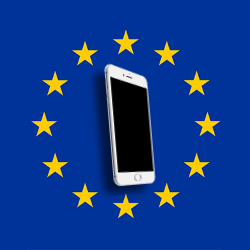
Since 15 June 2017, calling, texting and using the internet in other EU countries costs the same as in the Netherlands. The extra roaming charges will then be abolished. What exactly does this mean?
roaming
Anyone who uses their smartphone in another country does so via the network of a foreign provider. That so-called roaming Up to now, this has almost always been excluded from the monthly bundle for calling, texting and using the internet. Anyone who did this across the border had to either pay extra or take out a foreign bundle. These additional roaming charges have expired on June 15, 2017.
What does it mean?
The extra charges for roaming have been abolished within the EU from 15 June 2017. This means that calling, texting and using the internet in another EU country costs just as much as at home. If you stay within your bundle, the costs are included in your subscription. And if you go over your bundle, you have to pay extra. But according to the rates that apply within the Netherlands. And not the expensive foreign rate that applied until now. The rules apply to people with a subscription, but also to prepaid bundles.
Where do the rules apply?
The new rules apply in all 28 countries of the European Union: Belgium, Bulgaria, Cyprus, Denmark, Germany, Estonia, Finland, France, Greece, Hungary, Ireland, Italy, Croatia, Latvia, Lithuania, Luxembourg, Malta, Netherlands, Austria , Poland, Portugal, Romania, Slovenia, Slovakia, Spain, Czech Republic, United Kingdom (England, Scotland, Wales and Northern Ireland), Sweden. Norway, Iceland and Liechtenstein also join. In those three countries, the new rules will come into effect later than June 15. Switzerland, Turkey, Vatican City, Monaco and Andorra are not covered by the new rules by default. Check with your provider if these countries are still accepted.
What is not covered?
The new rules do not apply to mobile calls and text messages from the Netherlands to other countries. Calling, texting and using the internet in countries outside the EU are also not covered. The providers themselves determine how much that costs. Cruise ships, ferries and airplanes are also not covered by the rules.
Are there exceptions to the new rules?
Providers may use a so-called fair use policy (fair use policy). This means that fair and normal use of, for example, the internet across borders is allowed. If you use the internet across the border more often than at home, you may have to pay a surcharge. What is also not allowed is to buy a SIM card in a cheap foreign country and use it to make long-term calls and use the internet in the Netherlands to save costs. Abuse is punished.
Can I use unlimited internet across the border?
No, the providers are obliged to provide you with a reasonable amount of GBs, in line with the cost of your subscription or prepaid card. But unlimited ‘free’ online is not an option. Check with your provider how many GBs you can use across the border. If your subscription is converted to cheaper than 3.85 euros per GB per month, the provider may set a maximum for internet across the border. The company must inform you about this. Similar rules apply to a prepaid card: check with your provider.
How much data do I actually use?
The phone shows how much data you have recently used. It is useful to set this to 0 at the beginning of your time abroad, so that you can keep an eye on how much data usage you have.
With Android phones, the options to view data usage are at Settings > Data usage > Mobile data usage. iPhones have this option in Settings > Mobile network. There is data about the data usage of all apps. To set this to 0, tap Reset data.
Will my internet bundle be used up faster abroad?
That depends on your internet behavior. Within the Netherlands you are often connected to WiFi and the bundle is not used. Wi-Fi is less available across the border, and you are more likely to be online via the mobile network. Compared to home, the bundle will shrink faster in most cases. If you go over the maximum, you will have to pay extra. Your provider can tell you how much to pay.
What does SeniorWeb advise?
It is advisable to keep an eye on your data usage. Many apps use the internet connection in the background for everything. That ‘invisible’ use can shrink your bundle across the border very quickly. SeniorWeb recommends turning off the roaming option on your phone and only turning it on when you want to actively use the internet. After use, turn the option off again. This keeps the data usage clear. The tip ‘Border over: data roaming off’ explains how to disable and enable this.